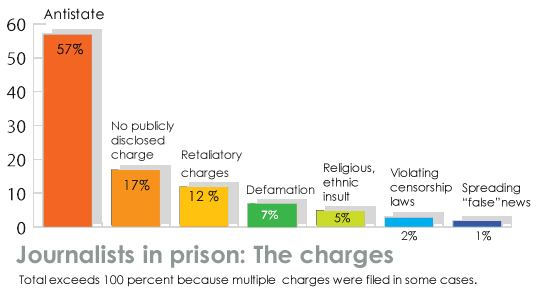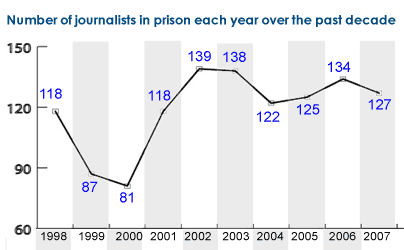CPJ: One in 6 jailed journalists held without charge Census shows an overall decline; China remains the leading jailer
New York, December 5, 2007—Nearly 17 percent of journalists jailed worldwide in 2007 were held without any publicly disclosed charge, many for months or years at a time and some in secret locations, the Committee to Protect Journalists has found in a new analysis.
CPJ’s annual worldwide census of imprisoned journalists found 127 behind bars on December 1, a decrease of seven from the 2006 tally. (Read detailed accounts of each imprisoned journalist.) The drop is due in large part to the release this year of 15 Ethiopian journalists who were either acquitted or pardoned of antistate charges stemming from a broad government crackdown on the press. CPJ and others had waged an intensive advocacy campaign on their behalf.
China, which has failed to meet its promises to improve press freedom before the 2008 Olympics, continued to be the world’s leading jailer of journalists, a dishonor it has held for nine consecutive years. Cuba, Eritrea, Iran, and Azerbaijan round out the top five jailers among the 24 nations that imprison journalists.
Antistate allegations such as subversion, divulging state secrets, and acting against national interests remain the most common charge used to imprison journalists worldwide, CPJ found. About 57 percent of journalists in the census are jailed under these charges, many of them by the Chinese and Cuban governments.
The proportion of journalists held without any charge at all increased for the third consecutive year. Eritrea and Iran account for many of these cases, but the United States has used this tactic as well. U.S. authorities have not filed charges or presented evidence against Al-Jazeera cameraman Sami al-Haj, held for more than five years at Guantánamo Bay, or Associated Press photographer Bilal Hussein, held in Iraq for more than 19 months. The U.S. military said in November that Hussein’s case would be referred to Iraqi courts for prosecution but continued to withhold details explaining the basis for the detention.
“Imprisoning journalists on the basis of assertions alone should not be confused with a legal process. This is nothing less than state-sponsored abduction,” CPJ Executive Director Joel Simon said. “While we believe every one of these 127 journalists should be released, we are especially concerned for those detained without charge because they’re often held in abysmal conditions, cut off from their lawyers and their families.”

The practice of holding journalists without charge has eroded basic standards of fairness and accountability. Iranian authorities, for example, jailed Mohammad Seddigh Kaboudvand in July, but they have yet to file formal charges or bring the editor before a judge. Kaboudvand’s lawyer has not been allowed to see him or review the government’s case. Eritrean authorities will not even confirm whether the journalists in its custody are alive or dead. At least 19 journalists worldwide are being held in secret locations, CPJ found, with Eritrea the worst offender in this regard.
Continuing a decade-long trend, Internet journalists make up an increasing proportion of CPJ’s census. Bloggers, online editors, and Web-based reporters constitute about 39 percent of journalists jailed worldwide. Print journalists make up the largest professional category, accounting for about half of those in jail.
The rise of Internet journalism and its risks are evident in China, where 18 of the 29 jailed journalists worked online. China’s list includes Shi Tao, an award-winning journalist serving a 10-year sentence for e-mailing details of a government propaganda directive to an overseas Web site. The Internet giant Yahoo supplied account information to Chinese authorities that led to Shi’s 2004 arrest and triggered an ongoing debate over corporate responsibility.
China continues to rely heavily on the use of vague antistate charges, imprisoning 22 journalists on accusations such as “inciting subversion of state power.” Despite China’s 2001 promises to the International Olympic Committee that it would ensure “complete media freedom,” its leaders continue to jail reporters and operate a vast system of censorship, CPJ found in a special report in August. CPJ has urged the IOC and the Games’ corporate sponsors to hold Beijing accountable to its word.
“China has remained the world’s worst jailer of journalists from the day the Games were awarded through today, just months before the Olympics are scheduled to begin,” said CPJ’s Simon. “China and the IOC have an obligation to make good on the broad promises made when Beijing was selected. For the torch to be lit in Beijing next August as 29 journalists languish in jail would mock the ideals of the Olympic movement.”
Fidel Castro ‘s absence from day-to-day power has not led to media reform in Cuba, the world’s second-leading jailer. Twenty-four Cuban journalists are imprisoned, CPJ found, most of them swept up in a March 2003 crackdown on the independent press. Eritrea ranks third, with 14 jailed journalists, all held in undisclosed prisons.
Two countries-Iran and Azerbaijan-are new to the list of leading jailers. Facing domestic dissent and economic troubles, Iranian authorities are meting out harsher penalties to journalists. Twelve are now in Iranian jails. One of them, Adnan Hassanpour, editor of the now-banned weekly Aso, was sentenced to death after being convicted in January of endangering national security and engaging in propaganda against the state.
 Imprisonments also spiked in Azerbaijan, where nine journalists are currently in jail. The imprisoned ranks include editor Eynulla Fatullayev, whose April arrest came shortly after he published an in-depth report alleging an official cover-up in the 2005 slaying of fellow Azerbaijani editor Elmar Huseynov.
Imprisonments also spiked in Azerbaijan, where nine journalists are currently in jail. The imprisoned ranks include editor Eynulla Fatullayev, whose April arrest came shortly after he published an in-depth report alleging an official cover-up in the 2005 slaying of fellow Azerbaijani editor Elmar Huseynov.
CPJ research shows that journalist imprisonments rose significantly after governments worldwide imposed sweeping national security laws in the wake of the 2001 terrorist attacks on the United States. Imprisonments stood at 81 in 2000 but have since averaged 129 in CPJ’s annual surveys.
Here are other trends and details that emerged in CPJ’s analysis:
- In about 12 percent of cases, governments used a variety of charges unrelated to journalism to retaliate against critical writers, editors, and photojournalists. Such charges range from regulatory violations to drug possession. In the cases included in this census, CPJ has determined that the charges were most likely lodged in reprisal for the journalist’s work.
- Criminal defamation, the next most common charge, was lodged in about 7 percent of cases. Charges of ethnic or religious insult were filed in about 5 percent of cases, while violations of censorship rules account for another 2 percent.
- Print and Internet journalists make up the bulk of the census. Television journalists compose the next largest professional category, accounting for 6 percent of cases. Radio journalists account for 4 percent, documentary filmmakers 2 percent.
- The longest-serving journalists in CPJ’s census are Chen Renjie and Lin Youping, who were jailed in China in July 1983 for publishing a pamphlet titled Ziyou Bao (Freedom Report). Codefendant Chen Biling was later executed.
CPJ believes that journalists should not be imprisoned for doing their jobs. The organization has sent letters expressing its serious concerns to each country that has imprisoned a journalist. In addition, CPJ sent requests during the year to Eritrean and U.S. officials seeking details in cases in which journalists were held without publicly disclosed charges.
CPJ’s list is a snapshot of those incarcerated at midnight on December 1, 2007. It does not include the many journalists imprisoned and released throughout the year; accounts of those cases can be found at www.cpj.org. Journalists remain on CPJ’s list until the organization determines with reasonable certainty that they have been released or have died in custody.
Journalists who either disappear or are abducted by nonstate entities, including criminal gangs, rebels, or militant groups, are not included on the imprisoned list. Their cases are classified as “missing” or “abducted.” Details of these cases are also available on CPJ’s Web site.